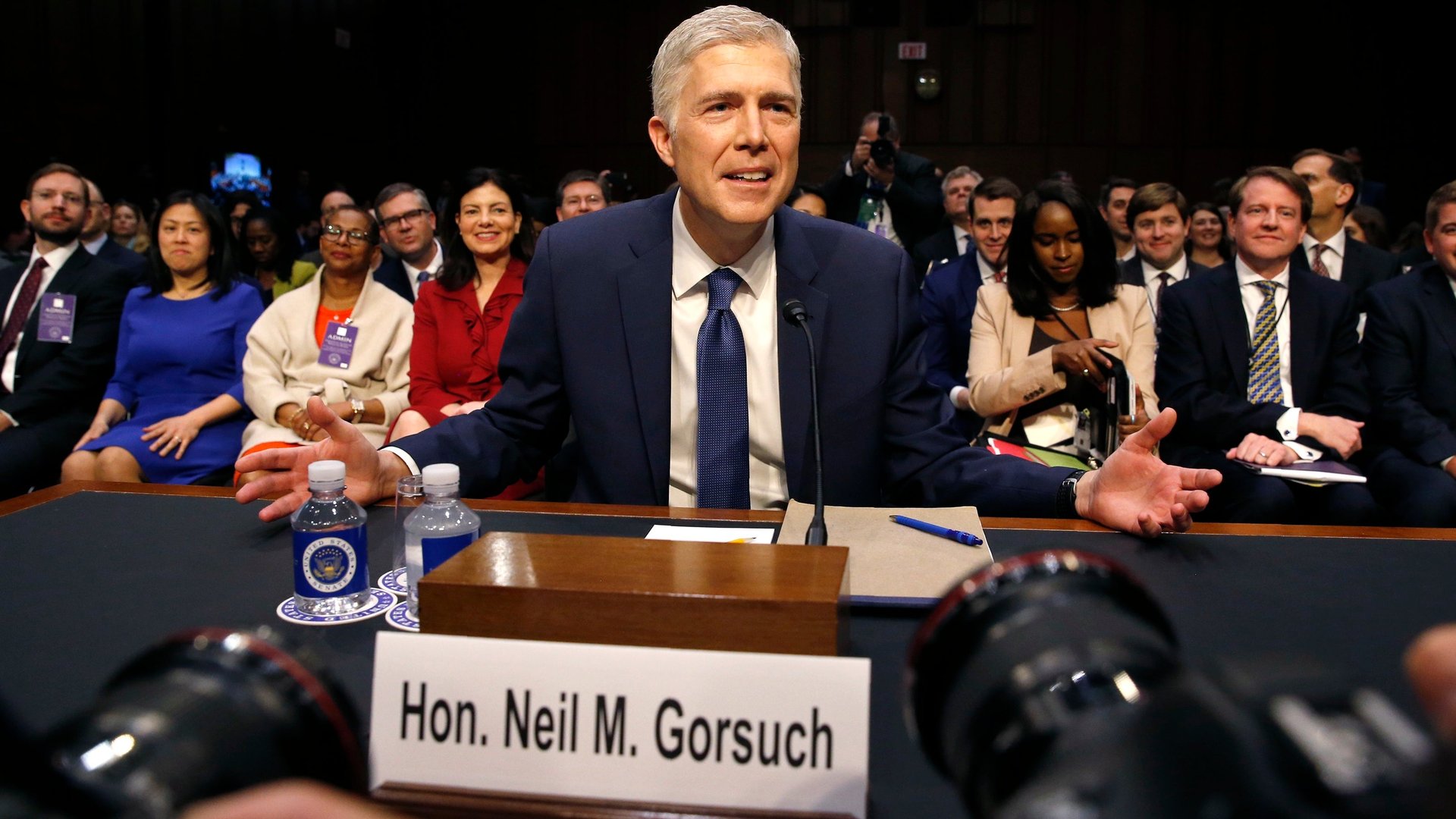What to listen for and what to ignore in Neil Gorsuch’s confirmation hearing
Yesterday the US Senate began confirmation hearings for Neil Gorsuch, president Donald Trump’s nominee for the vacant spot on the Supreme Court. Over three days senators will question him about his professional experience, and he will, presumably, illuminate his judicial philosophy.


Yesterday the US Senate began confirmation hearings for Neil Gorsuch, president Donald Trump’s nominee for the vacant spot on the Supreme Court. Over three days senators will question him about his professional experience, and he will, presumably, illuminate his judicial philosophy.
Theoretically, the exercise is meant to reveal how Gorsuch would approach cases if appointed. But don’t expect to learn much about how he’d decide on any given issue. There are two views about why.
The popular view is that confirmation hearings have become an empty ritual. That’s articulated in a recent Los Angeles Times piece by Eric Segall, a law professor at Georgia University and author of Supreme Myths: Why the Supreme Court Is Not a Court and Its Justices Are Not Judges. Segall argues that both senators and nominees have avoided straight talk at confirmation hearings since 1987, when the Senate chose not confirm Judge Robert Bork.
Segall believes Bork’s views on privacy, speech, and gender discrimination were “out-of-touch” with those of most Americans and that the Senate legitimately rejected him. But as a result, the confirmation process became a boilerplate procedure. Instead of stating a position—on abortion, say—a nominee now merely pledges to ”follow the law of the land.”
This answer is unimpeachable, as following the law is what judges are supposed to do. Answering this way also, Segall says, works for both nominees and politicians. He suspects some senators would prefer not to get straight answers “so that they don’t have to answer to their constituents.”
But it doesn’t serve the purpose of confirmation hearings, nor does it help the public. So the professor wants the senators to ”act like grown-ups” and demand Gorsuch reveal his real opinions. “There is no doubt that he has given serious consideration to issues such as abortion, affirmative action and executive power. He should not promise how he would decide future cases, but he should be required to disclose his real views on these and other controversial constitutional questions. The American people have a right to know,” Segall writes.
Fair enough. But the professor ignores an important point, and this is the other view on why you shouldn’t expect to learn much from confirmation hearings. It is that a judge’s inner musings are supposed to be irrelevant, because the system is premised on its professionals’ ability to separate their personal views from their obligations under the law.
Although it’s hard to believe that people can be disciplined enough to act and decide against their perceived interests, that’s what good judges and lawyers do every day. For example, criminal-defense attorneys aren’t pro-child-sex-abuse or pro-murder, but every day they fight for the rights of people accused of such crimes, forcing the prosecution to prove cases beyond a reasonable doubt. That is the point of justice.
This means that if a judge is doing his job, knowing his view on social issues won’t show much about his work. Judges are required, and trained, to separate legal opinions from personal positions to the extent humanly possible. Knowing what Gorsuch thinks about executive action in the abstract won’t—or shouldn’t—tell us how he’ll decide on, say, a travel ban; that should depend on the specifics of the case. And if we don’t believe it’s humanly possible for judges to be apolitical, then maybe the whole system needs rethinking.
Still, there’s a point to confirmation hearings, despite their shortcomings. Form and function are intertwined in the law; appearances mean something. Even if we do not hear Gorsuch’s true opinions, or find out exactly how he’ll rule as a judge, we’ll still see important things about him—how he listens to others, how he responds to questions, how he behaves under pressure. We will see something real, in short. Just not the things we think we need to see.